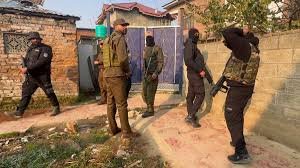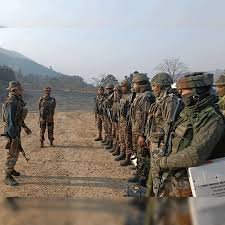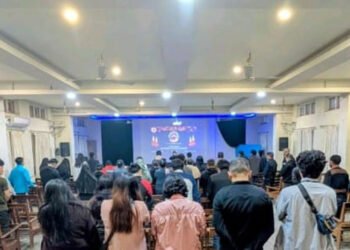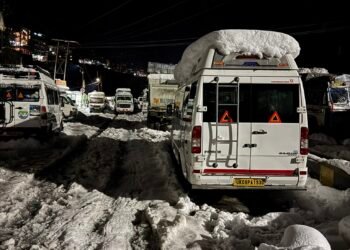Nearly 500 people were questioned, and several were detained under preventive laws in Anantnag’s Mattan jail.
BY PC Bureau
November 12: The Jammu and Kashmir Police on Wednesday launched an extensive crackdown across the Valley, conducting raids at over 500 locations allegedly linked to individuals associated with the banned Jamaat-e-Islami (JeI), officials said.
The coordinated searches spanned multiple districts — Kulgam, Pulwama, Shopian, Baramulla and Ganderbal — and marked one of the largest operations in recent months targeting alleged networks of the proscribed Islamist group.
According to reports, over 200 sites were searched in Kulgam alone, where police also carried out more than 400 cordon-and-search operations over the past week. Nearly 500 persons believed to have ties to banned organisations were questioned, and several have been placed under preventive detention at District Jail Mattan in Anantnag, PTI reported.
Police claimed to have seized documents, digital devices and other incriminating material during the raids.
Fresh Intel on Attempts to Revive Jamaat
Officials said the crackdown followed intelligence inputs suggesting that elements linked to Jamaat-e-Islami, which was banned in 2019 under the Unlawful Activities (Prevention) Act (UAPA), were attempting to reorganise the outfit under new names and reactivate dormant networks.
“The searches are part of preventive action to thwart any such regrouping attempts,” a senior police officer said on condition of anonymity.
Operation Coincides With Red Fort Blast and Faridabad Terror Module Probe
The raids come against the backdrop of the Red Fort car blast in Delhi on Monday evening, in which a Hyundai i20 exploded near Gate No. 1 of the metro station, killing eight people. The Delhi Police have registered a case under the UAPA and the Explosives Act, though the cause of the blast remains under investigation.
Around the same time, the J&K Police claimed to have busted an “inter-state and transnational terror module” in coordinated raids with the Haryana and Uttar Pradesh police in Faridabad and Saharanpur.
Two Kashmiri doctors — Adeel Ahmad Rather and Muzamil Shakeel — were among those arrested in connection with the module. Shakeel was a faculty member at Al-Falah University in Faridabad’s Dhauj area. Two other staffers from the same university — Umar Mohammed and Shaheen Shahid — were also detained.
During the Faridabad raid, authorities said they recovered 360 kilograms of inflammable substances and other materials “that could be used for terrorist activities.”
STORY | J-K Police raids around 500 locations linked to banned organisations including JeI
Police on Wednesday intensified its crackdown on the terror ecosystem in Kashmir, carrying out raids at around 500 locations linked to terrorist associates, and persons affiliated with… pic.twitter.com/Ou75kH4oST
— Press Trust of India (@PTI_News) November 12, 2025
Al-Falah University Distances Itself From Arrested Faculty
In a statement issued on Wednesday, Al-Falah University clarified that it had “no connection with the said persons apart from their official roles at the institution.”
“No such chemical or material, as alleged by certain platforms, is being used, stored, or handled within the university premises,” the statement said, adding that all its laboratories are used “strictly for academic training purposes.”
Vice-Chancellor Bhupinder Kaur said the university was cooperating fully with investigating agencies “to ensure a logical, fair and conclusive determination in this matter of national security.”
READ: Delhi LG Upholds Firing of Two MCD Teachers Over Corruption
READ: Centre Set to Reinstall Manipur Govt by Month-End
No Formal Link Yet Between Raids and Blast
While the timing of the operations has raised speculation about possible linkages, officials have so far not connected the Valley raids, the Faridabad module, or the Red Fort explosion.
Senior officers maintained that the Valley crackdown was part of a wider counter-terror sweep aimed at dismantling potential sleeper cells and monitoring individuals suspected of reviving banned networks.














